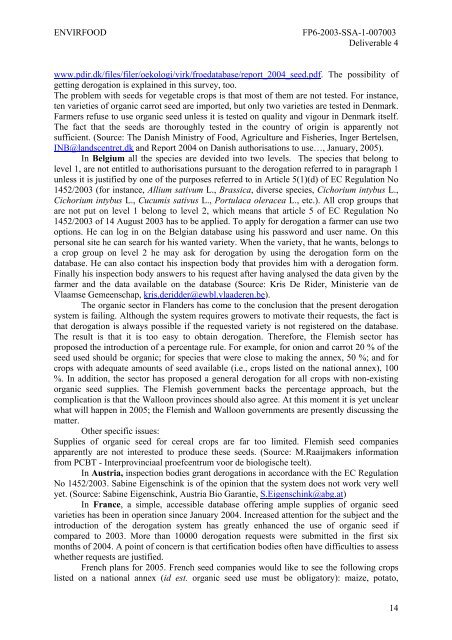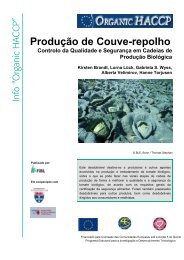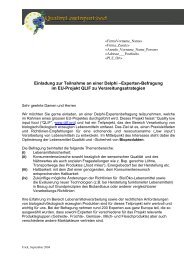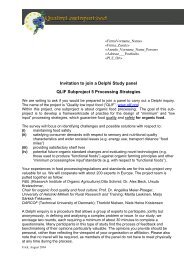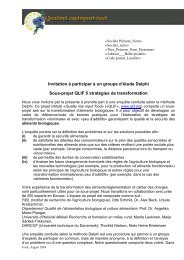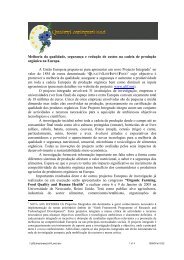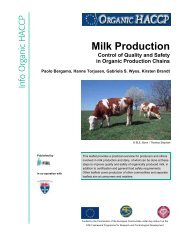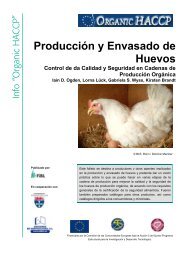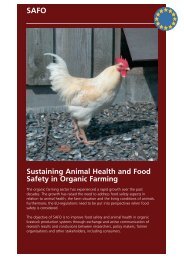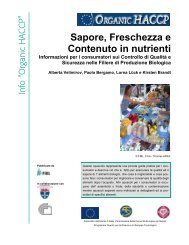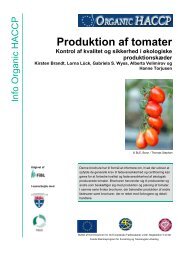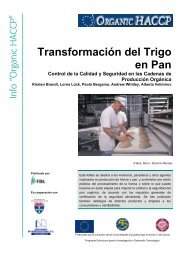ORGANIC SEED PROPAGATION: CURRENT STATUS AND ...
ORGANIC SEED PROPAGATION: CURRENT STATUS AND ...
ORGANIC SEED PROPAGATION: CURRENT STATUS AND ...
Create successful ePaper yourself
Turn your PDF publications into a flip-book with our unique Google optimized e-Paper software.
ENVIRFOOD<br />
FP6-2003-SSA-1-007003<br />
Deliverable 4<br />
www.pdir.dk/files/filer/oekologi/virk/froedatabase/report_2004_seed.pdf. The possibility of<br />
getting derogation is explained in this survey, too.<br />
The problem with seeds for vegetable crops is that most of them are not tested. For instance,<br />
ten varieties of organic carrot seed are imported, but only two varieties are tested in Denmark.<br />
Farmers refuse to use organic seed unless it is tested on quality and vigour in Denmark itself.<br />
The fact that the seeds are thoroughly tested in the country of origin is apparently not<br />
sufficient. (Source: The Danish Ministry of Food, Agriculture and Fisheries, Inger Bertelsen,<br />
INB@landscentret.dk and Report 2004 on Danish authorisations to use…, January, 2005).<br />
In Belgium all the species are devided into two levels. The species that belong to<br />
level 1, are not entitled to authorisations pursuant to the derogation referred to in paragraph 1<br />
unless it is justified by one of the purposes referred to in Article 5(1)(d) of EC Regulation No<br />
1452/2003 (for instance, Allium sativum L., Brassica, diverse species, Cichorium intybus L.,<br />
Cichorium intybus L., Cucumis sativus L., Portulaca oleracea L., etc.). All crop groups that<br />
are not put on level 1 belong to level 2, which means that article 5 of EC Regulation No<br />
1452/2003 of 14 August 2003 has to be applied. To apply for derogation a farmer can use two<br />
options. He can log in on the Belgian database using his password and user name. On this<br />
personal site he can search for his wanted variety. When the variety, that he wants, belongs to<br />
a crop group on level 2 he may ask for derogation by using the derogation form on the<br />
database. He can also contact his inspection body that provides him with a derogation form.<br />
Finally his inspection body answers to his request after having analysed the data given by the<br />
farmer and the data available on the database (Source: Kris De Rider, Ministerie van de<br />
Vlaamse Gemeenschap, kris.deridder@ewbl.vlaaderen.be).<br />
The organic sector in Flanders has come to the conclusion that the present derogation<br />
system is failing. Although the system requires growers to motivate their requests, the fact is<br />
that derogation is always possible if the requested variety is not registered on the database.<br />
The result is that it is too easy to obtain derogation. Therefore, the Flemish sector has<br />
proposed the introduction of a percentage rule. For example, for onion and carrot 20 % of the<br />
seed used should be organic; for species that were close to making the annex, 50 %; and for<br />
crops with adequate amounts of seed available (i.e., crops listed on the national annex), 100<br />
%. In addition, the sector has proposed a general derogation for all crops with non-existing<br />
organic seed supplies. The Flemish government backs the percentage approach, but the<br />
complication is that the Walloon provinces should also agree. At this moment it is yet unclear<br />
what will happen in 2005; the Flemish and Walloon governments are presently discussing the<br />
matter.<br />
Other specific issues:<br />
Supplies of organic seed for cereal crops are far too limited. Flemish seed companies<br />
apparently are not interested to produce these seeds. (Source: M.Raaijmakers information<br />
from PCBT - Interprovinciaal proefcentrum voor de biologische teelt).<br />
In Austria, inspection bodies grant derogations in accordance with the EC Regulation<br />
No 1452/2003. Sabine Eigenschink is of the opinion that the system does not work very well<br />
yet. (Source: Sabine Eigenschink, Austria Bio Garantie, S.Eigenschink@abg.at)<br />
In France, a simple, accessible database offering ample supplies of organic seed<br />
varieties has been in operation since January 2004. Increased attention for the subject and the<br />
introduction of the derogation system has greatly enhanced the use of organic seed if<br />
compared to 2003. More than 10000 derogation requests were submitted in the first six<br />
months of 2004. A point of concern is that certification bodies often have difficulties to assess<br />
whether requests are justified.<br />
French plans for 2005. French seed companies would like to see the following crops<br />
listed on a national annex (id est. organic seed use must be obligatory): maize, potato,<br />
14


